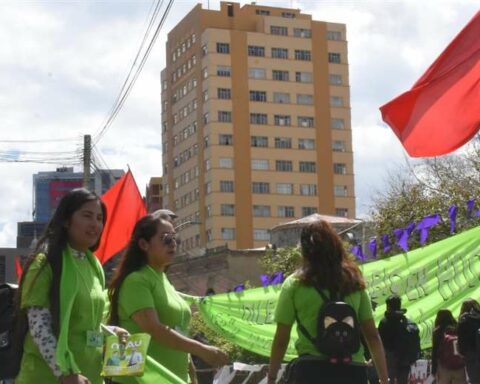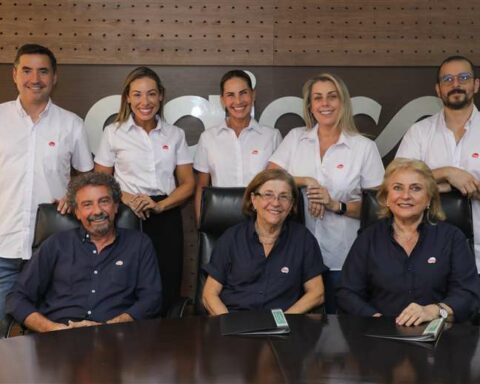Luis Escóbar / La Paz
40% of the PumaKatari and ChiquiTiti bus fleet are in operation, half of those that were in circulation last year in the city of La Paz. Users ask the Mayor’s Office to define and publish fixed schedules at stops to avoid long waits.
“Now we have an operating fleet of approximately 40%. We hope that the following week (the number of buses) will gradually increase, “said the mobility secretary of the Mayor’s Office of La Paz, Enrique Villanueva, who was inaugurated last Tuesday.
A former official of the Municipal Transportation Service (Setram) – who preferred to keep his name in reserve – explained that until last year they had around 85% of the bus fleet operating the seven routes that this system has in the city of La Paz.
“We had around 85% in service because five to 10% stayed in the yards for preventive or corrective maintenance, depending on the mileage they traveled or if they suffered any damage. The rest of the buses stayed in stand-by (or rest) to attend to requirements or emergencies, ”explained the former Setram official.
Until mid-2021 – when the circulation was 85% – the buses had a frequency between seven and 12 minutes in peak hours. But the service suffered financial problems since August last year. The administration of the current mayor, Iván Arias, accused his predecessor, Luis Revilla, of not leaving enough resources to continue with the service on a regular basis.
In August a first expansion of bus frequencies began: from 20 to 30 minutes. In December this period was further extended to 50 and 60 minutes.
Regarding this situation, Villanueva told Página Siete that measures will be applied. “We plan to make the necessary adjustments to reduce the frequency until next week, regain the trust and support of the people,” he added.
Economic problems and the pandemic -which limited the capacity in closed spaces- caused a drop in the demand for buses.
A report – which was presented last December – establishes that in 2019, before Covid-19, this system transported 9.5 million passengers (31,572 average users per day). After the pandemic, last year, the PumaKatari carried four million passengers a year (13,558 average citizens per day).
According to this report, La Paz’s passenger per kilometer (IPK) index is the lowest on the continent. While Guayaquil’s transportation systems reach 12.43; that of Santiago reaches 6.4 and that of La Paz registered 1.42 in 2019 and fell to 0.76 in 2021.
Long waits
At the Puma stops, users wait patiently for the bus to arrive, but some despair of the delay and leave the line to take minibuses or buses.
“At the beginning the service was excellent and on all lines. Now the quality has dropped a lot. The wait is very long and we cannot waste time. I ask that they put schedules (at the stops) in this way one will know how long to wait, ”said one of the users at the Camacho Avenue stop.
Mario C., a wheelchair user, commented that “before” they waited 15 minutes. “Now we must wait half an hour or more. We have to wait because when it arrives it takes us faster. Public service stops at every corner ”, he declared.
The solution?
Mayor Arias guaranteed that the PumaKatari service “will not die”, but at this time it is subjected to an evaluation. “We are making a sincere and clear diagnosis (…) We are in a difficult situation, the doctor’s task is not to kill the patient, it is to save him, give him more life and leave him strengthened,” he said.
According to the mayor, the diagnosis will make it possible to make appropriate decisions and avoid “wrong conclusions” about what will be done with the La Paz Bus service.
Arias announced that they are working on “new routes” that will be implemented this year and that they will not go through the sections of traditional transport. He said that in the dialogue tables that are held with the leaders of the sector, they spoke about intermodal transport, where Setram will feed the unions and vice versa.
“When I talk about new routes, the transporters go out (to complain). Excuse me, you are at the negotiating table (with the Mayor’s Office) and there we talk about intermodal transport, for example that Collective 2 feeds Puma and vice versa, ”explained the mayor.
They will evaluate new routes
Villanueva said that with the arrival of the 66 buses, projects to expand the service on three new routes will be evaluated. Luis Revilla’s management had planned to expand the service to Mallasa, Pasankeri and La Portada.
“In accordance with the previous planning, three new routes are planned that must be evaluated. The financial issue is fundamental because routes that do not have a reasonable subsidy will not be created, “he said.
Villanueva recalled that as a result of the municipal financial crisis, the supply of the service was reduced, so one of the priorities of his management will be to improve this issue in balance with demand. “The Puma, as a result of the financial crisis, has had a reduction in supply, but that means that certain elements have to be adjusted to regain supply levels, but of course this must go hand in hand with demand,” he said.
Part of the service improvement includes reducing service frequencies from next week, improving income through advertising with the rental of spaces within the bus and other benefits.
Villanueva said that the price of the ticket “will not change up or down” and announced that the technical and professional staff will be evaluated “to help raise the service to standards.”
I ask that the schedules be posted (at the stops). That way you will know how long to wait for the Puma
A user of the service
We have an operating fleet of approximately 40%. We hope it (…) increases
Enrique Villanueva, Secretary of Mobility
We are in a difficult situation, the doctor’s task is not to kill the patient, it is to save him and give him more life
Ivan Arias, Mayor of La Paz








